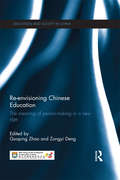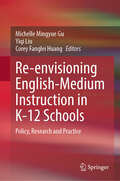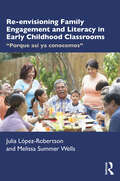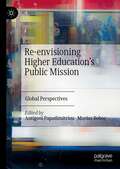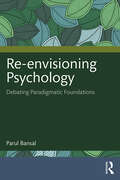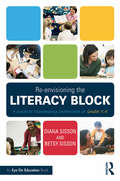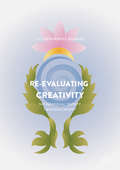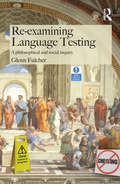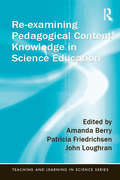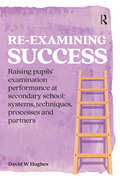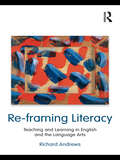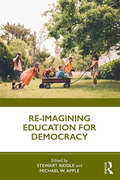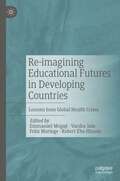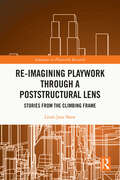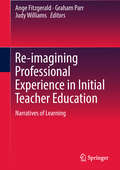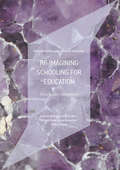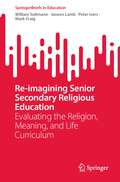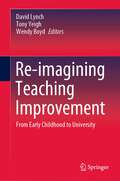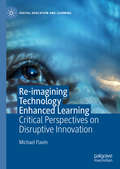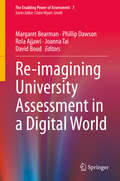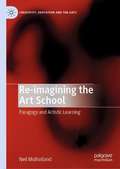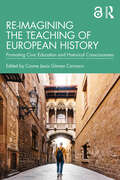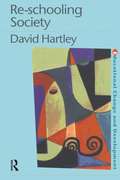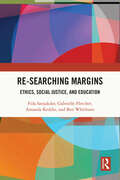- Table View
- List View
Re-envisioning Chinese Education: The meaning of person-making in a new age (Education and Society in China)
by Zongyi Deng Guoping ZhaoMaintaining education as a pedagogical space for human formation, this book is distinctive in looking at the crisis rather than the success of Chinese education. The editors and contributors, mostly overseas and mainland Chinese scholars, argue that modern Chinese education has been built upon a superficial and instrumental embrace of Western modernity and a fragmented appropriation of Chinese cultural heritage. They call for a rethinking and re-envisioning of Chinese education, grounded in and enriched by various cultural traditions and cross-cultural dialogues. Drawing on Chinese history and culture, Western and Chinese philosophies, curriculum and pedagogical theories, the collected volume analyzes (1) why education as person-making has failed to take root in contemporary China, (2) how the purpose of education has changed during the process of China’s modernization, and (3) what a rediscovery of the meaning of person-making implies for rethinking and re-envisioning Chinese education in the current age of globalization and social change. Re-envisioning Chinese Education: The meaning of person-making in a new age discusses among other issues: China’s Historical Encounter with the West and Modern Chinese Education Rediscover Lasting Values: Confucian Cultural Learning Models in the Twenty-first Century Rethinking and Re-envisioning Chinese Didactics: Implications from the German Didaktik Tradition The New Basic Education and the Development of Human Subjectivity: A Chinese Experience This book will be relevant for scholars, researchers, and policy makers everywhere who seek a more balanced, more sophisticated, and philosophically better grounded understanding of Chinese education.
Re-envisioning English-Medium Instruction in K-12 Schools: Policy, Research and Practice
by Michelle Mingyue Gu Yiqi Liu Corey Fanglei HuangConnecting diverse theories and practices in English-medium Instruction (EMI) implementation, this book provides a comprehensive and systematic overview of EMI in K-12 settings in the Asian and European contexts. It addresses a wide range of ongoing challenges faced by many EMI policymakers and teachers and offers potential solutions or coping strategies. While it focuses on the contexts of Asia and Europe, the book can also provide inspirations or suggestions for researching and implementing EMI in other geographical or cultural contexts such as Africa. In brief, this book aims to (1) discuss up-to-date theories on EMI from different fields of research including language policy studies, applied linguistics and CLIL research, (2) provide detailed and critical reviews of EMI policies in K-12 education in the broad Asian and European contexts, (3) report empirical, classroom-based research on EMI implementation in these contexts and compare findings with those of the previous research, (4) engage different researchers and scholars from relevant fields in a dialogue about EMI-related theories, issues and challenges in these contexts and (5) serve as a hands-on resource for educational practitioners who are (interested in) practicing EMI.
Re-envisioning Family Engagement and Literacy in Early Childhood Classrooms: "Porque así ya conocemos"
by Julia López-Robertson Melissa Summer WellsFamilies are resources that are extremely powerful and important for young learners from minoritized backgrounds, yet such families are often overlooked, silenced, or ostracized. This book presents a much-needed framework for family and community engagement in the early childhood and elementary literacy classroom that embraces and foregrounds students’ unique cultural backgrounds. This book spotlights the families of minoritized learners and the crucial role that they play in building dynamic and inspiring environments for learning. To re-envision the engagement of these families in the early childhood classroom, the book provides an accessible understanding of Yosso’s theory of community cultural wealth. Covering key topics such as children’s literature and digital tools, the book features strategies for implementing culturally responsive classroom practices to create positive home–school partnerships. Each chapter highlights one type of capital in community cultural wealth—aspirational, linguistic, familial, social, navigational, and resistant—and gives teachers guidance on working with and supporting the efforts of families both inside and outside of the classroom. This book is an essential resource to inform current and future early childhood educators on how to gain deeper understandings of what families—especially from Communities of Color—already are doing for the education of their children, and how best to support them.
Re-envisioning Higher Education’s Public Mission: Global Perspectives
by Antigoni Papadimitriou Marius BobocThis book covers initiatives related to higher education’s public mission such as university-community engagement, knowledge transfer, economic development, and social responsibility, using empirical and conceptual cases in the US, South America, Europe, Africa, and Asia. In order to develop a better understanding of public mission initiatives in higher education across the globe, the volume editors developed a theoretical framework emerging from organizational theory. Each chapter analysis uses both external environmental elements (political, economic, sociocultural, and technological), as well as internal institutional elements (mission, vision, leadership, and governance). Finally, each chapter highlights issues related to implementation and challenges with the intent of prompting readers to consider appropriate ways in which to adopt some of the lessons learned by the contributing authors.
Re-envisioning Psychology: Debating Paradigmatic Foundations
by Parul BansalThis book studies the ideological nature of mainstream scientific psychology. It raises critical questions about the dominant forms of psychological theorization and praxis, based on their validity, social relevance and power privileges. Re-envisioning Psychology critically interrogates scientific images of the mind, individual, gender, development, society and culture that mainstream psychology promotes. The issues taken up in this book revolve around the pivotal concerns of psychology’s scientific basis, its dominant quantitative research methodology, the construction of ‘individual’ as the unit of analysis, the conceptualization of ‘social’, ‘cultural’ and ‘gender’ in relation to individualism, and the understanding of abnormality as shaped by the discourses of medical science and capitalism.Comprehensive and topical, the book will be useful to students, researchers, and teachers of psychology, applied psychology, social work, gender and women studies, and sociology. It will also be of interest to professional counsellors and psychotherapists.
Re-envisioning the Literacy Block: A Guide to Maximizing Instruction in Grades K-8
by Diana Sisson Betsy SissonHow do you ensure you’re using literacy instruction effectively to meet the needs of all of your students? In this book from Diana and Betsy Sisson, you’ll learn an innovative approach to using the literacy block in a gradual release model that allows you to provide grade-appropriate teaching as well as meaningful, individualized instruction to close the academic gaps of struggling learners and offer accelerated experiences for advanced students. What’s Inside ·Part I of the book lays out the authors’ framework for the Core Block. ·Part II explains how to use the re-envisioned block to integrate the core components of word study, vocabulary development, strategic reading instruction, writers’ craft, and expanded reading opportunities,, ·Part III reveals how to use differentiation, project-based learning, and assessment to prepare students for new literacy demands. ·The appendix provides literacy block schedules, tools for phonics development and morphology study, and correlations to the Common Core. Each chapter includes practical tools and examples, as well as "In Action" boxes show how the ideas look in an authentic classroom.
Re-evaluating Creativity: The Individual, Society and Education
by Lili Hernández-RomeroThis book proposes a groundbreaking approach to the study of personal creativity, linking this to the analysis of the chakras, or centers of energy, of the subtle system suggested by the Eastern philosophy called Sahaja Yoga. It argues that creativity is to be re-learnt through a process of self-review, a self-examination which is underpinned by the author’s concept of the outsider to the self, a pervasive condition characterized by a tendency to be connected to the outer world at the expense of the inner world. The author analyses creativity from three different but interrelated aspects –the individual, society and education - and maps out a route that may take the individuals into an understanding of blockages in their creative process. It also examines aspects that have contributed to sustain the condition of the outsider to the self, hindering people’s creativity. It argues that the traditional education system is both constricting and releasing factor of creativity. Finally, through the use of auto-ethnography, the author reveals a process of blocked and unblocked creativity. This book is a key read for all those interested in psychology, sociology, education and cultural studies.
Re-examining Language Testing: A Philosophical and Social Inquiry
by Glenn FulcherWinner of the SAGE/ILTA Book Award 2016 Re-examining Language Testing explores ideas that form the foundations of language testing and assessment. The discussion is framed within the philosophical and social beliefs that have forged the practices endemic in language education and policy today. From historical and cultural perspectives, Glenn Fulcher considers the evolution of language assessment, and contrasting claims made about the nature of language and human communication, how we acquire knowledge of language abilities, and the ethics of test use. The book investigates why societies use tests, and the values that have driven changes in practice over time. The discussion is presented within an argument that an Enlightenment inspired view of human nature and advancement is most suited to a progressive, tolerant, and principled theory of language testing and validation. Covering key topics such as measurement, validity, accountability and values, Re-examining Language Testing provides a unique and innovative analysis of the ideas and social forces that shape the practice of language testing. It is an essential read for advanced undergraduate and postgraduate students of Applied Linguistics and Education. Professionals working in language testing and language teachers will also find this book invaluable.
Re-examining Pedagogical Content Knowledge in Science Education (Teaching and Learning in Science Series)
by Amanda Berry John Loughran Patricia FriedrichsenPedagogical Content Knowledge (PCK) has been adapted, adopted, and taken up in a diversity of ways in science education since the concept was introduced in the mid-1980s. Now that it is so well embedded within the language of teaching and learning, research and knowledge about the construct needs to be more useable and applicable to the work of science teachers, especially so in these times when standards and other measures are being used to define their knowledge, skills, and abilities. Re-examining Pedagogical Content Knowledge in Science Education is organized around three themes: Re-examining PCK: Issues, ideas and development; Research developments and trajectories; Emerging themes in PCK research. Featuring the most up-to-date work from leading PCK scholars in science education across the globe, this volume maps where PCK has been, where it is going, and how it now informs and enhances knowledge of science teachers’ professional knowledge. It illustrates how the PCK research agenda has developed and can make a difference to teachers’ practice and students’ learning of science.
Re-examining Success: Raising pupils’ examination performance at secondary school: systems, techniques, processes and partners (Practical Teaching)
by David HughesIt’s time to look at how to maximise examination success for your pupils and your school in a whole new way.While the examination performance of pupils can define a school’s success, schools have been less than systematic in preparing pupils to give their optimal performance. They focus too heavily on outcomes and too lightly on inputs to the learning process which influence performance. Whole school revision strategies, if they exist, are often curriculum knowledge based, and not designed to support and challenge individual pupils effectively.This book provides the research and practical insights required to radically review and remodel exam preparation provision with a view to ensuring more pupils, particularly those that are vulnerable, can perform to their potential. It explores recent knowledge acquisition and retention strategies, looks at reviewing pedagogical approaches across the curriculum, and addresses the need to work with pupils and parents in new ways. Most importantly it takes an ethical and mentally healthy approach to looking at effective exam preparation.Individual teachers or school leaders can use the book to enhance their current provision at a personal level, while headteachers can drive more radical change by implementing the strategies and approaches at a whole school level.
Re-framing Literacy: Teaching and Learning in English and the Language Arts (Language, Culture, and Teaching Series)
by Richard AndrewsImaginative and attractive, cutting edge in its conception, this text explicates a model for the integration of language arts and literacy education based on the notion of framing. The act of framing – not frames in themselves – provides a creative and critical approach to English as a subject. Re-framing Literacy breaks new ground in the language arts/literacy field, integrating arts-based and sociologically based conceptions of the subject. The theory of rhetoric the book describes and which provides its overarching theory is dialogic, political, and liberating. Pedagogically, the text works inductively, from examples up toward theory: starting with visuals and moving back and forth between text and image; exploring multimodality; and engaging in the transformations of text and image that are at the heart of learning in English and the language arts. Structured like a teaching course, it is designed to excite and involve readers and lead them toward high-level and useful theory in the field. Offering an authoritative, clear guide to a complex field, it is widely appropriate for pre-service and in-service courses globally in English and language arts education.
Re-imagining Education for Democracy
by Stewart Riddle Michael W. AppleContemporary education research, policy and practice are complex and challenging. The political struggle over what constitutes curriculum and pedagogy is framed by quasi-markets and technocratic models of education. This has had a significant effect on larger issues of policy. But it has also had profound effects inside educational sites in terms of the economics and politics of what is and is not considered 'legitimate' knowledge, over what should be taught, how it should be taught, and by whom. Re-imagining Education for Democracy takes up the unfinished project of resisting the de-democratisation of education and growing levels of social and educational inequality. Where are the spaces for change and articulating hopeful alternatives? How might we imagine and produce different futures? What are the opportunities for affirmative interference, and how could we produce a more sustainable re-imagining and re-doing of the critical project of education? The work is framed within two complementary sections: the first addresses some key policy, political and philosophical concerns of contemporary educational contexts, while the second provides a series of empirical case studies and other local–global narratives of resisting and reframing dominant discourses in education around the world. The chapters provide a range of empirical, methodological and conceptual focuses, from different educational communities and international contexts, engaging with the proposition of re-imagining education for democracy in multiple and diverse ways. This book will be essential reading for researchers and students of education research, policy and practice.
Re-imagining Educational Futures in Developing Countries: Lessons from Global Health Crises
by Emmanuel Mogaji Felix Maringe Robert Ebo Hinson Varsha JainThis book explores the challenges and precarity of higher education post-pandemic, explicitly focusing on higher education in emerging countries. Looking beyond the pandemic, the editors and contributors provide a holistic view of the residual legacies of global health crises like COVID-19 in developing countries. The book calls for the need to reimagine, reevaluate and reposition the higher education system: exploring the challenges experienced by students, staff, administrators and other stakeholders. Bringing forth insights from researchers, practitioners and senior leadership, the book shares theoretical and practical insights on dealing with the aftermath of a pandemic and what can be learned for the future. It will be of interest and value to researchers, practitioners and leaders who wish to understand a develop new approaches for their teaching and management post-pandemic.
Re-imagining Playwork through a Poststructural Lens: Stories from the Climbing Frame (Advances in Playwork Research)
by Linda ShawThis book explores how poststructural theory can make an important contribution to the growing body of work on playwork as an academic field of practice and research. Drawing on theoretical concepts used by sociologists and philosophers, such as the sociological imagination (Mills); hauntings and the fictive (Derrida) and technologies of power and the self (Foucault), the text considers how these devices may be methodologically productive for playwork research. It reframes research into children and childhood as a process in which research and practice are connected but diverse skills. The book raises questions around power and voice, and highlights the complexity of research which involves human participants and their roles as researcher and/or researched. Chapters relate concepts from post-structural, feminist research and frames them within the context of playwork practice through the use of vignettes constructed from stories told by playwork practitioners and the children with whom they work. A valuable addition to an emerging academic field, this book will be of great interest to researchers and students in the fields of playwork research, education and youth studies, early childhood students and the sociology of education.
Re-imagining Professional Experience in Initial Teacher Education: Narratives of Learning
by Judy Williams Ange Fitzgerald Graham ParrThis book takes a fresh look at 'professional experience' in initial teacher education in Australia. Using collaborative narrative methodologies, the authors critically explore the ways in which one faculty of education engages with schools, industry, the teaching profession and government policy to deliver an innovative professional experience program. It includes chapters offering new perspectives on more traditional practicums in schools, as well as those reporting on exciting partnership initiatives where pre-service teachers, teacher educators and practitioners work together to teach and learn in new and mutually beneficial ways. There is a particular focus on the professional learning of all stakeholders from across the professional experience program. The book allows readers to gain a new understanding of the experiences and learning opportunities available to all stakeholders when a professional experience program makes a priority of boundary work, relational work and identity work. With the critical and creative power of narrative to convey what other research methodologies cannot, it shows how one institution has developed a variety of innovative approaches and structures in response to on-going debates on quality in teacher education, the role of educational partnerships in teacher preparation and the personal and professional insights gained from such opportunities.
Re-imagining Schooling for Education
by Kitty Te Riele Debra Hayes Glenda Mcgregor Martin Mills Aspa BaroutsisThis book provokes a conversation about what supportive schooling contexts for both students and teachers might look like, and considers how schooling can contribute to a more socially-just society. It takes as its starting point the position of the most marginalised students, many of whom have either been rejected by or have rejected mainstream schooling, and argues that the experiences of these students suggest that it is time for schools to be reimagined for all young people. Utilizing both theory and data, the volume critiques many of the issues in conventional schools that work against education, and presents evidence 'from the field' in the form of data from unconventional schooling sites, which demonstrates some of the structural, relational, curricular and pedagogical changes that appear to be enabling schooling for education for their students. It will be essential reading for students and researchers in the fields of education, sociology and social work, and will also be of great interest to practising teachers.
Re-imagining Senior Secondary Religious Education: Evaluating the Religion, Meaning, and Life Curriculum (SpringerBriefs in Education)
by Mark Craig William Sultmann Janeen Lamb Peter IversThis book examines and reports the findings regarding the level of satisfaction by students, teachers and parents with an innovative senior secondary Religious Education curriculum ‘Religion, Meaning and Life’ (RML). The stimulus for RML is found in the changing profile of students within faith-based schools and the motivation of school authorities to be inclusive and responsive to changing needs and priorities of students and families. Curriculum practices typically mirror this continuing renewal as community expectations give rise to innovation in curriculum practice. This concept of continuity and discontinuity is evidenced in the field of Religious Education,, which recognizes religious plurality while giving preference to an imagination centred on inclusion, hospitality and respectful dialogue. In this context, new pathways are being explored as the reality and significance of Religious Education in faith-based school remain a priority for Christian organizations in Australia.Mindful of the diversity of expectations within the Catholic school, the curriculum initiative of RML was developed, supported and implemented. The La Salle Academy of the Australian Catholic University reviewed this senior secondary curriculum across three years and presents in this book an independent, evaluative report of the findings, together with insights for implementation at scale and associated applications across Christian faith-based institutions.
Re-imagining Teaching Improvement: From Early Childhood to University
by David Lynch Wendy Boyd Tony YeighThis research-based book focuses on re-imagining how to improve pedagogical and environmental approaches to teaching and teacher education, across the early childhood to higher education sectors. It motivates educators, academics and researchers to stimulate thinking around the use of research to transform professional teaching and teacher education in imaginative ways. It showcases insights into the design and implementation of successful approaches to teaching improvement at the direct level of practice. This book provides a clear ‘how to’ approach that identifies the general principles by which teaching improvement can be planned, monitored and evaluated, as well as guidelines for contextualising these principles within specific educational levels and situations.
Re-imagining Technology Enhanced Learning: Critical Perspectives on Disruptive Innovation (Digital Education and Learning)
by Michael FlavinThis book analyses technology enhanced learning through the lens of Disruptive Innovation theory. The author argues that while technology has not disrupted higher education to date, it has the potential to do so. Drawing together various case studies, the book analyses established technologies through a Disruptive Innovation perspective, including virtual learning environments, and includes Wikipedia as an example of successful innovative disruption. The author also examines the disruptive potential of social media technologies and the phenomenon of user-owned technologies. Subsequently, the author explores strategic narratives for technology enhanced learning and imagines what the Disruptive University might look like in the future. This book will be valuable for scholars of technology enhanced learning in higher education as well as those looking to increase their understanding of and practice with technology enhanced learning.
Re-imagining University Assessment in a Digital World (The Enabling Power of Assessment #7)
by Margaret Bearman David Boud Rola Ajjawi Phillip Dawson Joanna TaiThis book is the first to explore the big question of how assessment can be refreshed and redesigned in an evolving digital landscape. There are many exciting possibilities for assessments that contribute dynamically to learning. However, the interface between assessment and technology is limited. Often, assessment designers do not take advantage of digital opportunities. Equally, digital innovators sometimes draw from models of higher education assessment that are no longer best practice. This gap in thinking presents an opportunity to consider how technology might best contribute to mainstream assessment practice.Internationally recognised experts provide a deep and unique consideration of assessment’s contribution to the technology-mediated higher education sector. The treatment of assessment is contemporary and spans notions of ‘assessment for learning’, measurement and the roles of peer and self within assessment. Likewise the view of educational technology is broad and includes gaming, learning analytics and new media. The intersection of these two worlds provides opportunities, dilemmas and exemplars. This book serves as a reference for best practice and also guides future thinking about new ways of conceptualising, designing and implementing assessment.
Re-imagining the Art School: Paragogy and Artistic Learning (Creativity, Education and the Arts)
by Neil MulhollandThis book proposes ‘paragogic’ methods to re-imagine the art academy. While art schooling was revolutionised in the early 20th century by the Bauhaus, the author argues that many art schools are unwittingly recycling the same modernist pedagogical fashions. Stagnating in such traditions, today’s art schools are blind to recent advances in the scholarship of teaching and learning. As discipline-based education research in art eternally battles the perceived threat of epistemicide, transformative educational practices are rapidly overcoming the perennialism of the art school. The author develops critical case studies of open source and peer-to-peer methods for re-imagining the art academy (para-academia) and andragogy (paragogy). This innovative book will be of interest and value to students and scholars of the art school, as well as how the art academy can be reimagined and rebuilt.
Re-imagining the Teaching of European History: Promoting Civic Education and Historical Consciousness
by Cosme Jesús Gómez CarrascoThis book explores the challenges of teaching European history in the 21st century and provides research-informed approaches to history teaching that combine civic education, historical consciousness, and the teaching of controversial social issues. With contributions from researchers across Europe, the book includes both theoretical and case study chapters. The first part of the book addresses issues such as globalization and teaching in an interconnected world, using multicultural and critical approaches, decolonizing education, and teaching uncomfortable narratives of the past. The second part of the book showcases thematic chapters dedicated to teaching intersecting topics in the European curriculum such as violence and armed conflict, social inequality, gender equality, the technological revolution, and religion. Ultimately, this volume promotes criticality, civic engagement, and reflection on social issues, thereby prompting methodological change in the teaching of history as we know it. It will appeal to researchers and students of history education, democratic education, and citizenship education, as well as teacher educators and trainee teachers in history.
Re-membering Culture: Erasure and Renewal in Hmong American Education
by Bic NgoThe untold stories of resilience in Hmong American educationRe-membering Culture is a deep exploration of the intricate dynamics of cultural memory and education, centering the experiences of Hmong American students and educators. Arguing that the school, as a product of coloniality, perpetuates the marginalization and erasure of non-Western epistemologies, author Bic Ngo sheds light on the subtle yet impactful process of structured forgetting within the American education system. This politics of forgetting, in turn, contributes to the fragmentation of Hmong cultural heritage, identity, and community. Based on a high school in an urban center with a considerable Hmong immigrant community, Ngo&’s work draws on extensive ethnographic research with Hmong American community leaders, school administrators, parents, teachers, staff, and high school students to understand how they navigate the terrain of Western pedagogy while attempting to retain and preserve Hmong knowledge systems. Exploring a range of school experiences, Ngo traverses students&’ challenges in balancing school with family life and the everyday cultural racism encountered in the classroom as well as grassroots efforts to preserve culture, including the establishment of a Hmong Cultural Club. Highlighting these experiences and voices, Ngo provides a nuanced understanding of the challenges Hmong Americans face within an assimilationist society while contesting the dominant anti-immigrant narratives of refugee suffering and poverty. Through these practices of (re)storytelling, resurgence, and refusal, she underscores the agency of the Hmong American community, illuminating how the critical consciousness fostered by re-membering serves as a powerful tool in confronting white hegemonic ideologies in education. Retail e-book files for this title are screen-reader friendly.
Re-schooling Society
by David HartleyThis text describes and explains the sense of uncertainty faced by educators as the millenium approaches. It highlights the many transitions taking place in all aspects of public life and education during the postmodern phase of late capitalism by using examples from the study of childhood, curriculum, pedagogy, assessment and organization of education. It also considers attempts made so far by policy makers in the western industrialized nations to come to terms with rapid cultural and social changes whilst, at the same time, trying to maintain competitive economies to meet the growing challenge of the emergent Pacific Rim nations.
Re-searching Margins: Ethics, Social Justice, and Education
by Ben Whitburn Amanda Keddie Fida Sanjakdar Gabrielle FletcherIdentity, power, and positionality play crucial roles in designing and implementing research critically and ethically across marginalized cultures and communities. Through four unique case studies, this book highlights the dilemmas faced by researchers in the field of education, demonstrating how they grapple with the ethics of research and with their role in the process. Re-searching Margins: Ethics, Social Justice and Education attends to research in four specific marginalized communities, whilst also engaging in a wider dialogue about the complex theories, methodologies and practices of ethical research in communities of difference. This book examines ethical research with cultures and communities as an exchange in which both the researcher and the researched bring complex contextual and biographical factors shaped by their histories, identities, and experiences. Drawing on the lives and research of four renowned scholars, this book will be of interest to researchers and policy makers in education who seek to engage ethically and justly with marginalized communities.
